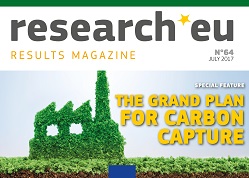Issue 64 of the research*eu results magazine – The grand plan for carbon capture
Questions are still pending regarding the deployment of some of the technologies required for all signatories to keep the promises of the Paris Climate Agreement. CCS (Carbon Capture and Sequestration) technologies are among these. Various reports have highlighted the critical role that CSS could play in meeting the climate goals set in the Paris agreement. More recently, several studies, including one from January 2017 published in the journal Nature Climate Change, took a step further. The latter states that ‘the continued lack of large-scale carbon capture and storage threatens 2030 targets and the longer-term Paris ambition of net-zero emissions.’ The Global CCS Institute, on the other hand, regrets that the current level of CCS deployment ‘does not go anywhere near what is required’ from CCS to meet the Paris climate target. So what do we do now? Luckily enough, scientists across Europe have been working relentlessly to raise more interest in CCS. Thanks to funding under FP7 and H2020, new infrastructure, industrial pilots, decision-making tools, technology improvements and brand new CCS systems are all under way. In fact, some of these solutions are so close that seven of them are sharing the spotlight for this new edition of the research*eu results magazine. Other topics in this edition include the following highlights: - First in-man studies demonstrate high prevalence of diabetes and cardiovascular disease in shift workers - Don’t let a good crisis go to waste - One step closer to the smart helicopter - How sensitive is climate to increased carbon dioxide in the long term? - Spy in the cow shed aids farmers - New insight into natural slate solves roofing market’s problems - Audio sketching goes high tech - New superconducting detectors for future space missions - More efficient ‘multi-switchable’ molecules could boost data storage The research*eu results magazine is the main source of information for all findings related to EU-funded science projects. It covers a large spectrum of scientific topics and is published 10 times per year in English. For more information, sign up for a free subscription and to download the new edition, please visit: http://cordis.europa.eu/research-eu/home_en.html(opens in new window)
Countries
Austria, Belgium, Bulgaria, Cyprus, Czechia, Germany, Denmark, Estonia, Greece, Spain, Finland, France, Croatia, Hungary, Ireland, Italy, Lithuania, Luxembourg, Latvia, Malta, Netherlands, Poland, Portugal, Romania, Sweden, Slovenia, Slovakia, United Kingdom



